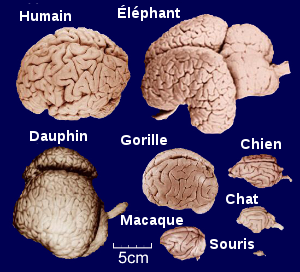 Image via Wikipedia
Image via WikipediaMost of my thoughts for this post come from an article in The Republic out of Columbus, Indiana. It was titled "Building a Smarter Ape?" and can be found here: http://www.therepublic.com/view/story/SCI-EVOLUTION_5848336/SCI-EVOLUTION_5848336/
 Image via Wikipedia
Image via WikipediaOf course it talks about the new Planet of the Apes movie, Rise of the Planet of the Apes. It reports that increasing the size of the brain alone wouldn't allow apes to attain most human qualities. Agreed.
It also claims that apes can be trained to use sign language. Disagree. Apes can learn signs, but that is very different than sign language, which is an entire set of languages with complex grammar, dialects, etc. American Sign Language is one of these, a full language. Signed Exact English is where people spell out the letters to make words in English, and very different from ASL, or any of the other sign
The article makes some interesting points about how some humans, because of developmental defects, have chimp sized brains, but that they, even with deficits, are much more advanced than apes. The author also explains that neanderthals had larger brains than we do, but had no art or symbolic thought. I read a research article that seems to refute this, saying that neanderthals were smarter than we give them credit for, but whatever.
 Image via Wikipedia
Image via WikipediaThe author of the article then gets into questions of advantages of a bigger brain. Some theorists suggest that "varied climates required early hominids to be craftier" which is ridiculous to me at least, as there's all kinds of animals that lived in varied climates. Maybe they are craftier, but they are certainly no closer to being human than the apes are. Others, the author says, think that bigger brains allowed them to get more mates. Again, this strategy would be equally effective for every other species that mates, but humans are different from all of them.
A final thought with regards to why the bigger brains is that having the father involved in child care allowed more kids to be raised, and for kids to have longer developmental periods (no other animal has an 18 year development period. :) This leads up to my favorite quote of the article "the no-strings-attached mating strategy of male chimps might be limiting their brainpower." I love it.
 Image by doug88888 via Flickr
Image by doug88888 via FlickrOf the listed reasons for a bigger brain, it is the only one that I can't immediately rule out. The others though seem to be possible driving causes for a bigger brain, whereas this one doesn't show a cause, but rather, a way that would allow for bigger brains to develop.
My reasoning on the issue, which is equally scientific (that is to say unscientific, just as these others are as yet unproven hypotheses) is that we have bigger brains, because we needed bigger brains, to allow us to do the things that God our father in heaven wants us to do. Or to not do those things, according to our wishes.
Actual science on this issue would require us to recreate human beings at multiple points on our proposed evolutionary path in the same environments that they were in, and then get out of the way and see what they do in terms of does the smartest guy get more girls, or are smart genes picked up over time by moving to different environments, or is there a point at which the males start helping to
 Image via Wikipedia
Image via WikipediaAnyway, the article finally gets into the issues of genetically altering apes to make them more human.
 Image via Wikipedia
Image via Wikipedia
No comments:
Post a Comment